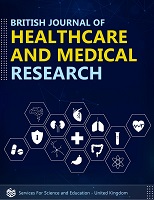Quality of Work Life among Nurses Interns During COVID-19 at Umm Al-Qura University
DOI:
https://doi.org/10.14738/bjhmr.101.13742Keywords:
Covid-19, Pandemic, Quality of Work-life, Nursing students, Nurses' internsAbstract
Background: The world is experiencing a global health crisis that is putting healthcare services to the test. In order to fully embrace the effects of COVID-19, it is critical to explore practical strategies that aim to expand the national nursing workforce. This study results will contribute to advance nursing as a profession and reinforce the foundation of Saudi Arabia's healthcare system transformation. Aim: To assess the quality of work-life for nurses' interns during the covid-19 pandemic at Umm Al Qura University. Design This study employed a descriptive quantitative cross-sectional method to identify major influencing factors of quality of work-life among nurses' interns during the covid-19 pandemic at Umm Al Qura University. Sample: An email invitation sent to 103 nurses' interns at Umm Al Qura University. Forty-four has completed the questionnaire, representing a response rate of 42.7%. Tools: An electronic self-administered questionnaire in the English language contained two parts; demographic information and The Work-Related Quality of Life (WRQoL) scale used to assess the quality of working life among nurses' interns. Results: Nurses' interns reported average scores (M±SD =3.28±0.62) on the overall WRQoL. The working conditions subscale got the highest score (M±SD =3.66±0.85) of WRQoL subscales, followed by the job career satisfaction subscale (M±SD =3.60±0.77). Nurses' interns reported the lowest scores (M±SD = 2.28±1.02) on the stress at work subscale. The demographic variables of age, marital status and having children were found to affect the WRQoL scores of participants. Conclusion: The quality of work-life is an indicator of nurses' intent to leave their training or job and turnover. This study concluded that nurses' interns were having an average level of quality of working life. The nurses' interns were satisfied with their working conditions and the job career. However, the nurses' interns experienced excessive levels of stress at work.
Downloads
Published
How to Cite
Issue
Section
License
Copyright (c) 2023 Lamia Ahmad Al-Shamrani, Hala Yehia, Nehal Mejze Jeza Alharbi, May H. Bagadood

This work is licensed under a Creative Commons Attribution 4.0 International License.






